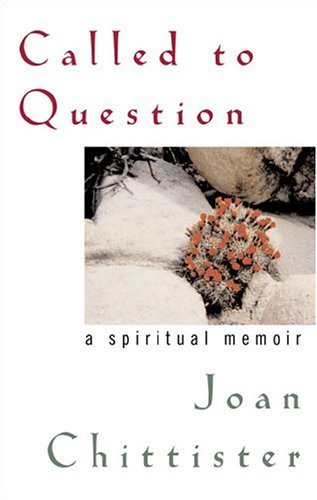Book Notes
 Joan Chittister, Called to Question; A Spiritual Memoir (Oxford: Sheed and Ward, 2004), 232pp.
Joan Chittister, Called to Question; A Spiritual Memoir (Oxford: Sheed and Ward, 2004), 232pp.
In this her most recent book, Sister Joan Chittister, a Benedictine nun and author of twenty-five books, continues to think out loud about just what it means to know, love, and follow Jesus in our crazy, contemporary world. This is the third book by her that I have read, and I have come to appreciate her spirit and gift to do what good writers do, which is to connect with the every day experiences and aspirations of her readers. Using her own spiritual journal entries from across a four year period, she pushes, pokes and prods at the various dimensions of Christian living. In particular, I appreciated three themes from this book that also recur in her other works.
Chittister writes from very much "inside the box," the box that is the Roman Catholic Church. But no one likes to be boxed in, much less a feminist like her, and so one theme from this book is what I would call institutional frustration with the church. Our Christian institutions and churches often purvey a sort of "god of the system" that asks us at some level to sublimate our deeply personal identities to the group identity. But then we risk forfeiting conscience and becoming what she describes as "institutional robots." So, we try, often with very limited success, to change the institution for the better. Others just want to leave the church out of frustration. In the end, Chittister pictures herself as a "loyal member of a dysfunctional family" (p. 135).
A keen scholar like Chittister is also full of provocative questions about important issues like women's ordination, the place of gays in the church, global justice, and, as a member of a Benedictine community, obedience to the institutional church. But critical questions are just what the church often suppresses, obscures, or responds to with superficial and ideological answers. We can acquiesce to this, too, out of fear of being wrong or even punished. But Chittister does not want to live the Christian life asking other people's questions or accepting their answers, so she keeps asking, seeking, and knocking: how does the Christian relate questions of personal conscience and intellectual integrity to churchly fidelity?
Personal failure and struggle are also prominent themes for Chittister. The problem, it would seem, is to foolishly accept perfection as our standard or goal. But that goal is an oppressive one, and a set up for failure, for no Christian this side of heaven will ever reach it: "The problem, of course, is that we fail. We know ourselves to be weak. We stumble along, being less than we can be, never living up to our own standards, let alone anyone else's. We eat too much between meals, we work too little to get ahead, we drink more than we should at the office party. We're all addicted to something. Those addictions not only cripple us, they convince us that we are worthless and incapable of being worthwhile. It is a self-fulfilling prophecy of the worst order because it traps us inside our own sense of inadequacy, of futility, of failure" (p. 195). Instead, we ought to view failure as "among the best friends of the soul" (p. 91). Rather than subscribe to the unattainable, we should come to appropriate the "sanctifying nature of mistakes and calculations" (p. ix).
Chittister begins her book with a well known story of the seeker who asked the monk just what they did in the monastery: "Oh, we fall and we get up, and we fall and we get up, and we fall and we get up again." Beyond the institutional frustrations, the stymied but important questions, and the realization of but limited progress, she encourages us to hear God's voice to keep going, to "find the me in me" (p. 111), and to cultivate a sense of being at home with yourself because of the extravagant love and grace of God.


